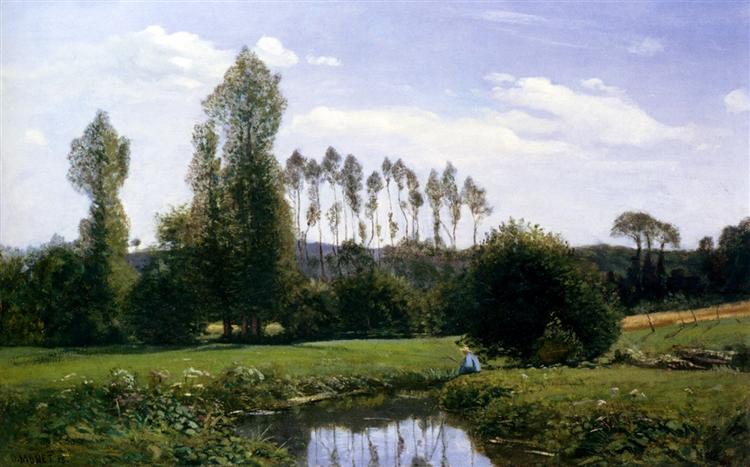Kuvaus
In Claude Monet's "View At Rouelles Le Havre" (1858), the viewer is immersed in a scene that masterfully captures the essence of the French coastal landscape, a recurring theme in the artist's work and in the Impressionist movement of which he is one of the greatest exponents. Monet, starting from an almost personal and emotional perspective, acts as a naturalistic chronicler of his surroundings, immortalizing moments that transcend the merely visual to evoke a connection with the viewer.
The composition of the painting presents a fundamental balance between sky, water and land, an almost triangular structure that guides the viewer's gaze throughout the scene. Above, a large, bright sky occupies a good part of the work, painted with soft shades of blue that intertwine with more greyish tones, suggesting an atmosphere of calm before a possible storm. This chromatic choice not only defines the mood of the moment, but Monet's loose, gestural brushstrokes also bring an almost tangible liveliness to the air.
The sea horizon is also a key element in this work. The gentle waves in the foreground, fragmented by the light, move as if they were dancing to the rhythm of the wind. Monet manages to capture this fluidity with a technique of short, rapid brushstrokes, which become a distinctive signature of Impressionism. This style is a clear display of his commitment to the perception of light and its interaction with the landscape.
In the foreground, a few ships can be seen sailing, which have been represented schematically. Although they are not the main focus of the work, their inclusion suggests activity and life at sea, as well as the link between humans and nature. The distance in which they are located and their modest size compared to the vastness of the landscape emphasize the insignificance of the human being compared to the immensity of the natural world, a recurring theme also in works from other artistic movements.
Although there are no figures anchored in the scene, the presence of the boats may suggest the daily life of the local people, implying a link between humanity and the landscape. This resonates with the impressionist philosophy which is based on the representation of the ephemeral and immediate, both of light and of experience.
"View At Rouelles Le Havre" is more than just a representation of a place; it is a testament to the lifestyle of 19th century France. Monet, a pioneer of Impressionism, immerses himself in the exploration of light and its ceaseless transformation of the landscape. The work gives us a window into a reality that, although ephemeral, is captured with such authenticity that it invites the viewer to meditate on the fleeting nature of time and on the way in which art can freeze those inescapable moments. In this sense, the painting establishes itself not only as a place of observation, but as a space of reflection inviting everyone to experience the serenity and beauty of the world through Monet's eyes.
KUADROS ©, a famous painting on your wall.
Hand-made oil painting reproductions, with the quality of professional artists and the distinctive seal of KUADROS ©.
Painting reproduction service with satisfaction guarantee. If you are not completely satisfied with the replica of your painting, we will refund 100% of your money.

